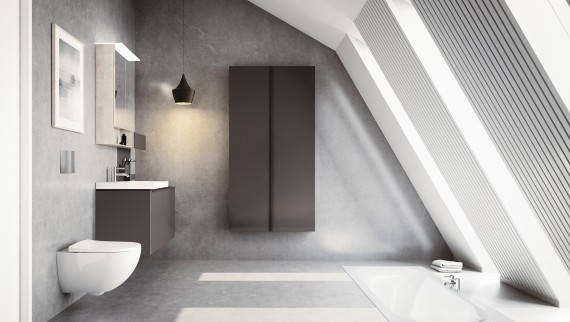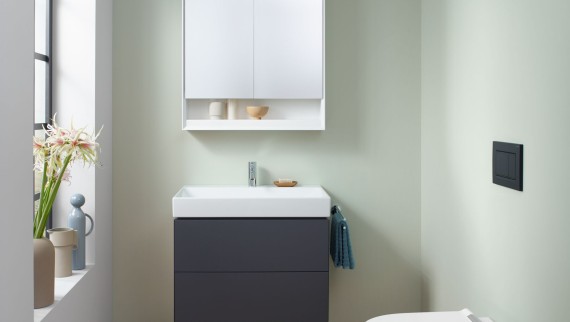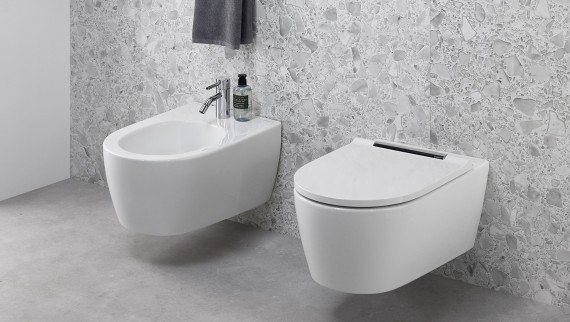Bathroom renovations: how to go about it!
Every day, we spend an average of up to one hour in the bathroom. Sanitary products are often subjected to decades of wear and tear, and bathroom furniture is exposed to high levels of moisture. That's why it's worth investing in good equipment to create a space that you can enjoy and feel comfortable in.
Here, we explain how long it takes to renovate a bathroom and what costs you should expect. In addition, we will guide you through the renovation process step by step, offering useful expert tips along the way.
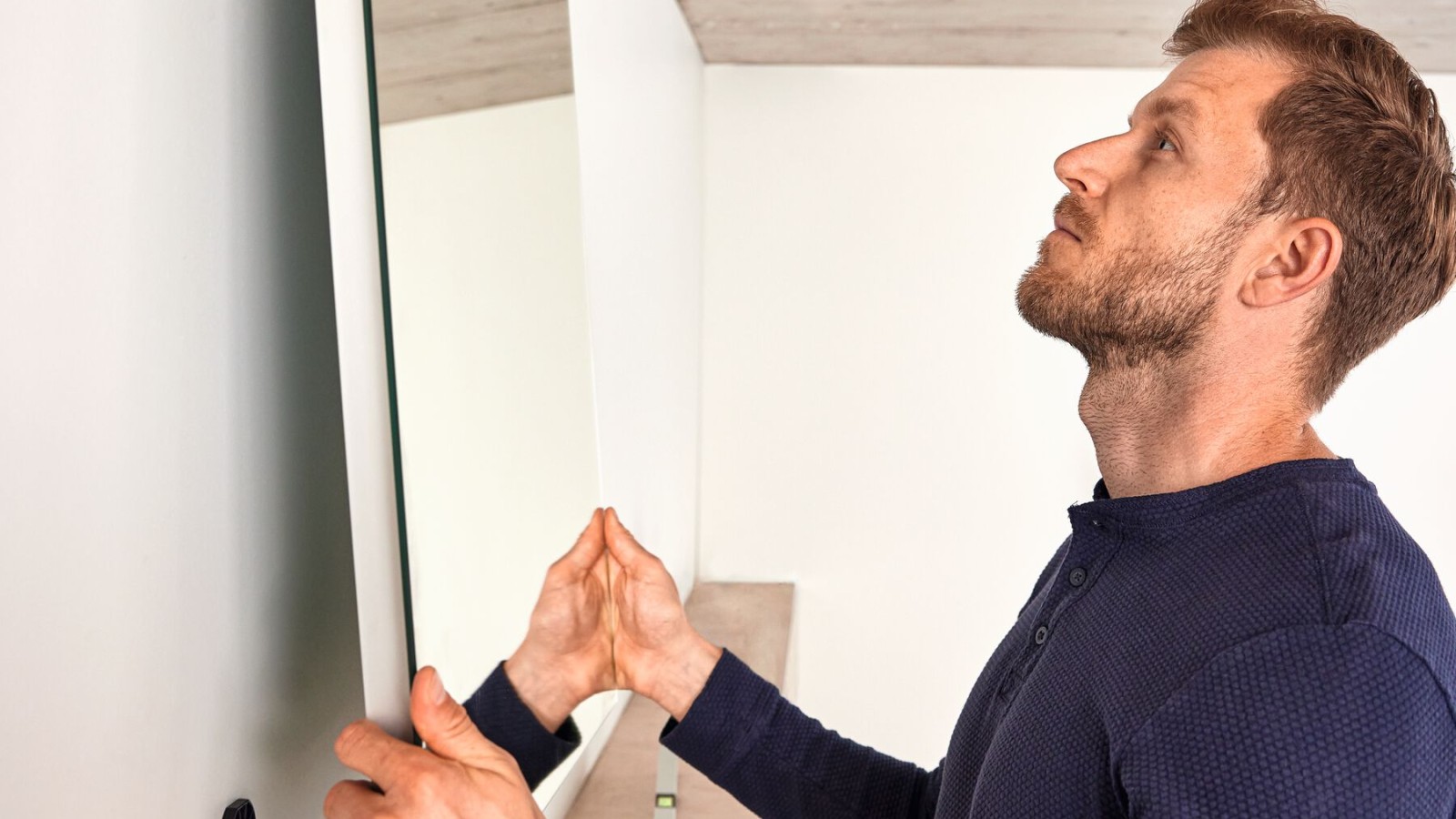
How long does a bathroom renovation take?
Are you considering renovating your bathroom and want to know how long it will take? It depends on the project.
| Cosmetic renovation | Renovation with new tiling | Structural renovation |
|---|---|---|
| In a cosmetic renovation, bathroom furniture, sanitary ceramic appliances and taps are replaced and the walls or ceiling are painted. But the tiles remain and no other structural work is carried out. | In addition to new bathroom furniture and ceramic appliances, tiling, dismantling, plastering or painting work is carried out. The floor plan and structure of the bathroom, however, remain unchanged. This means that the WC and washbasin will remain in the same place, and the bathtub will not be replaced by a shower or vice versa. | For a structural renovation of the bathroom, more work is done on the structure of the building. The wall is torn open, pipes are replaced throughout the room and appliances are moved. This may be the case, for example, if you want to move the toilet or the washbasin area somewhere else in the room or install a shower instead of a bathtub. In a structural renovation, additional trades such as electrics, heating and ventilation are also involved. |
| As a rule, the work for a cosmetic renovation takes 1-3 days. | In this scenario, you can plan approximately 3-5 days for the conversion. | For a structural renovation, expect 1-2 weeks of work. |
How much does it cost to renovate a bathroom?
The costs depend on the scope of the bathroom renovation, the number of square metres and the products chosen. Prices can also vary regionally and depending on the provider.
A little tip: where to save costs
When renovating your bathroom, you can save money on the scope and with the choice of appliances. Replacing single pieces of bathroom furniture and ceramic appliances can make a bathroom look completely new without any major structural measures. Product selection is also a decisive cost factor: Many manufacturers also offer high-quality products in the lower price segment.
From old to new: this is what modern bathrooms look like
Are you having trouble imagining your bathroom in a new light? Be inspired by these before-and-after bathroom renovation comparisons from different countries.
The challenges ranged from very little space to a lack of daylight and roof pitch. All the projects have one thing in common: the renovations have allowed the families to enjoy their beautiful new oases of well-being in timeless designs.
Before-and-after bathroom renovations Stories from around the world
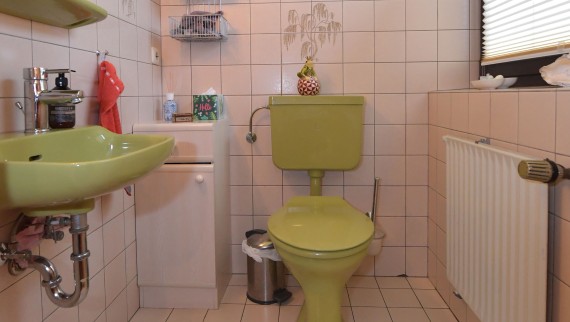
Renovating a small guest bathroom
A skilful renovation resulted in a comfortable guest bathroom covering just under two square metres, which is also equipped to meet the needs of the elderly.
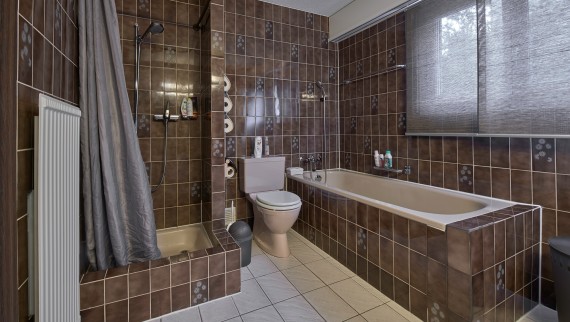
Ideas for bathroom renovation
How do you redesign an old bathroom? These examples with before and after photos show what is possible.
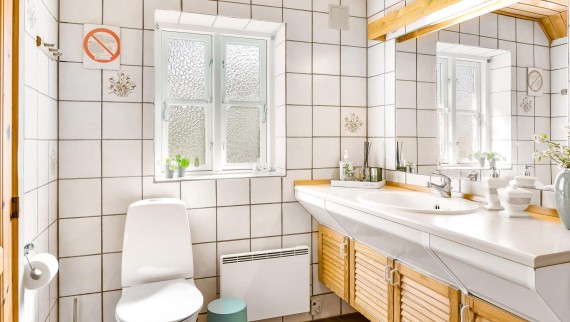
Small bathroom renovation – before and after
Looking to renovate a small bathroom? Even a few square metres can feel spacious and cosy with a good design.
Free tools for bathroom renovations
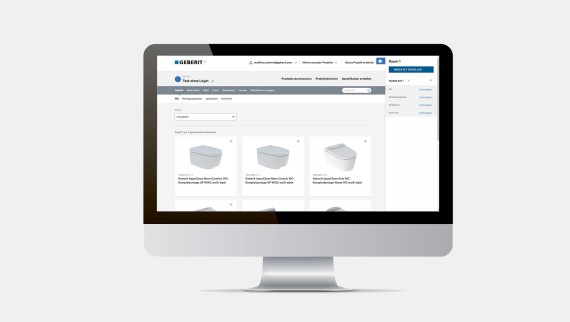
Geberit Specifier
This specification tool helps you find the right products for your project by showing wich products are compatible with each other.
How do you go about a bathroom renovation?
The decision to renovate the bathroom has been made. But where do you start? We will guide you through the stages of a renovation project and offer helpful tips along the way.
1. Bathroom planning: a good plan saves money
If you have a clear idea of what you need and what you like in the bathroom, the planning process will be more efficient.
- Make a checklist with your bathroom requirements: How many people use the bathroom and how much storage space will you need? Will several people use the bathroom at the same time, making a second washbasin area necessary? Are there enough power sockets and are they in the right place? Look ahead a few decades, too: what will your needs be then? As nice as a bathtub is now, you might appreciate a floor-even shower with a bench much more in 20 years' time.
- Get inspiration online – home design magazines, Pinterest, Instagram and manufacturers' websites are good sources of inspiration. A mood board with printed photos, colour or material samples can also be helpful.
- Contact your trusted installation company or search for a specialist partner online. There are several platforms for finding providers in your area. It might be worth getting several cost estimates and comparing them with each other.
- The selected service provider will visit you at home to measure your existing bathroom and clarify your requirements, your ideas and the budget in a consultation.
- Then visit one or more showrooms, either at an installation company or at a wholesaler. Let expert staff guide you through the showroom (find a showroom near you here). Upon request, you will receive an appliance list with the selected products.
- If desired, the service provider can show you a 3D visualisation of your future bathroom.
- The service provider then prepares a detailed schedule. They also coordinate with the tradespeople for plumbing, heating, electricity and tiling.
2. Demolition work: remove old furniture, tiles and the like.
At this stage, it's down to the nitty-gritty, the demolition. Old furniture and sanitary products such as washbasins and WCs are taken out and the old tiles removed. Depending on the extent of the renovation, the walls will also be torn down.
Our savings tip: ask your service provider if you can do some of the demolition work yourself to save money. With a little manual skill, some dismounting work can done independently. But everything that follows the demolition work should be left to the professionals. They have the necessary knowledge of the materials, expertise and tools. They are also usually faster, and so cheaper.
3. Laying new pipes
During a structural renovation, pipes and lines for water, heating, ventilation and electrics are replaced.
- If sanitary objects such as the washbasin area or WC are being moved, the water supply connections and wastewater pipes also need to be moved.
- If you are installing a new floor-even shower, the wastewater pipes and connections must be re-laid.
- An electrician will take care of the necessary electrical lines and power connections.
This step may not only affect the bathroom – the pipes all the way down to the basement might also need to be replaced.
A little tip: more and more people are opting for the convenience of a shower toilet, which requires power connections at the toilet. Don't forget these connections in the planning phase. That way, the toilet can be upgraded to a shower toilet. A good service provider will raise the issue during the consultation.
4. Levelling and constructing the floor
Installing an open shower always involves a conversion. You should check in advance whether the requirements for installation are met. The construction height of the floor is important to consider, i.e. the overall construction of what is called the floor screed. In addition to the flooring, this also includes other layers such as thermal insulation and piping for underfloor heating. For walk-in showers, a specific minimum height is required for the trap. If the construction height of the floor is lower than the depth of the water seal, installation may not be possible or may require very complex and expensive conversion work.
In the shower area, the floor must also have a slope so that the water runs off. For optimal drainage, the slope should be about 2%.
As the shower is a damp area, sealing is also necessary. The degree of sealing necessary (room height or only certain areas) depends on local regulations.
5. Plastering and re-tiling the walls
In this step, the walls are plastered. The tiler will install new tiles while the painter will repaint the walls and ceiling.
A little tip: large tiles give the bathroom a spacious feel and are easier to clean because they have fewer grout joints.
6. Installing new bathroom furniture, washbasins, taps, etc.
The sanitary company will install the toilet and fit the washbasin and bathroom furniture. Taps, handles and lighting are also installed in the final assembly. The electrician installs switches and sockets.
Ideas for your bathroom renovation
Renovating a bathroom with roof pitch
Making the most of the space under the roof in the bathroom requires good planning. A space that looks generous on plans is much smaller in reality. Take a look at our helpful tips and tricks.
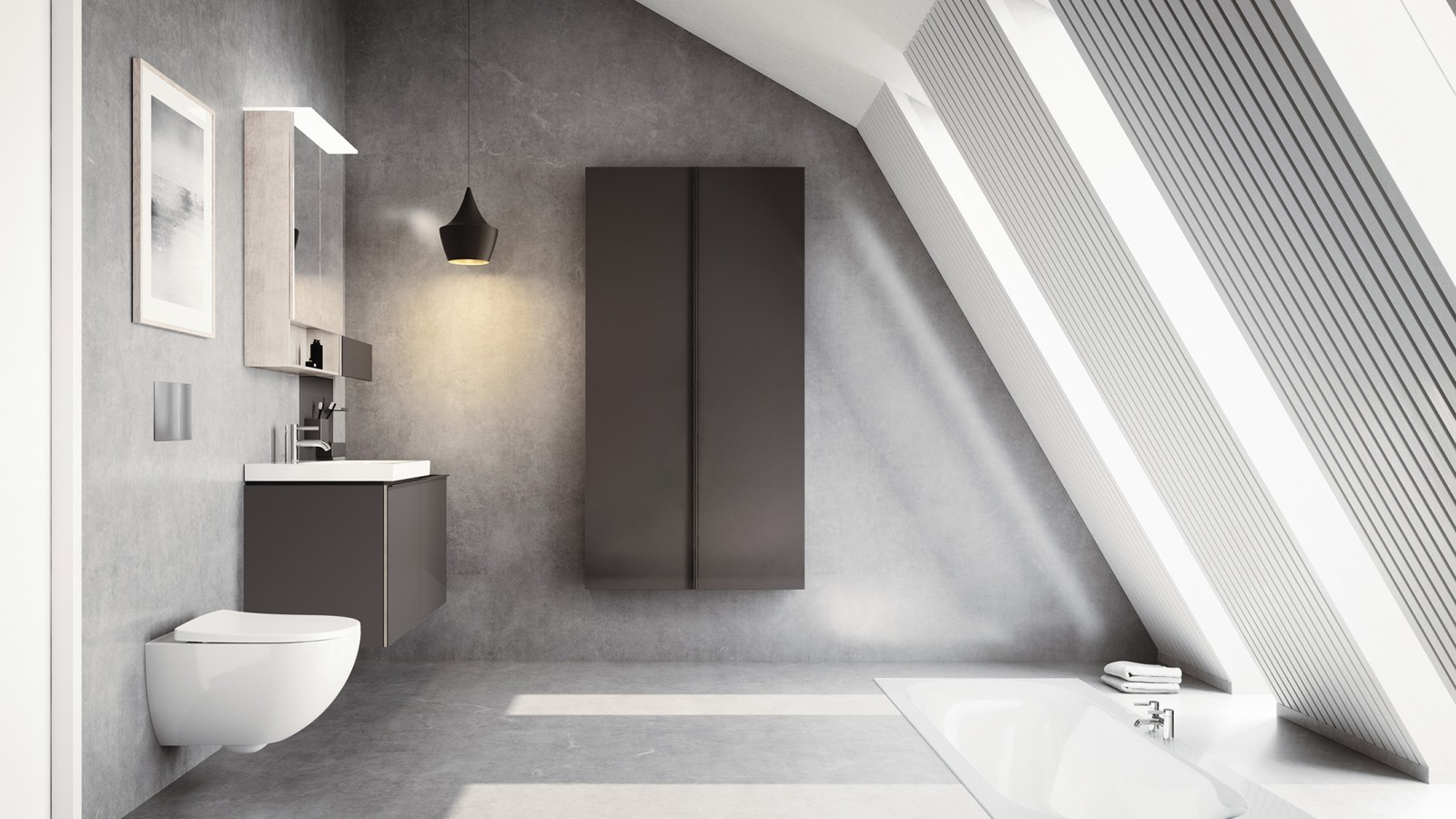
Ideas for the renovation of the guest toilet
Guest toilets and guest bathrooms tend to be short on space, which makes it all the more important to carefully consider design ideas and plans for a bathroom that is both functional and beautiful.
A modern walk-in shower
Floor-even, walk-in or open shower - all these terms describe showers that have become an indispensable part of the modern bathroom. Walk-in showers fit into almost any bathroom. Here, we explain what to keep in mind when planning a shower renovation.
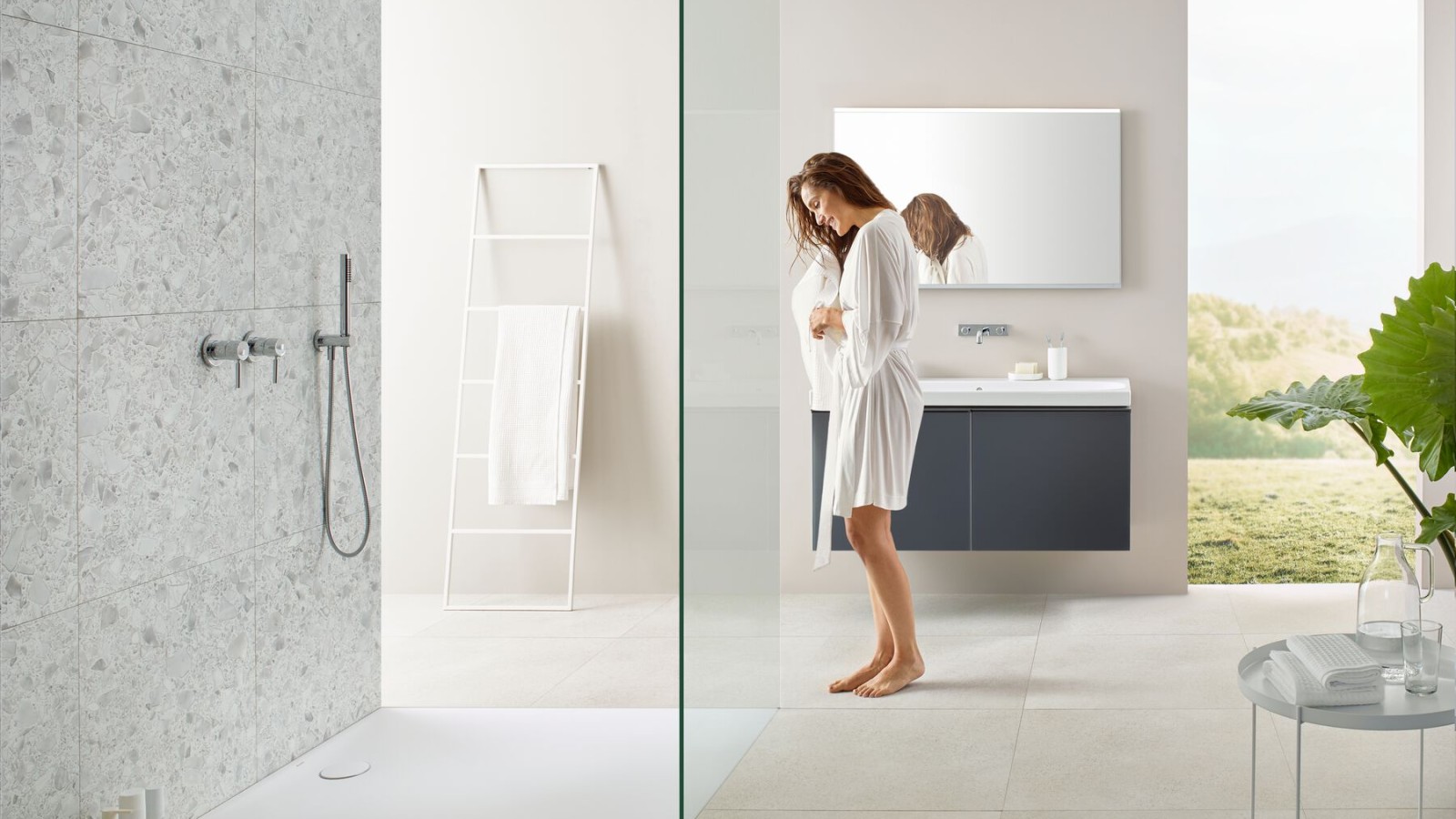
How small can a washbasin be?
In a narrow bathroom or a small guest WC, a handrinse basin should not take up too much space yet still be practical and attractive. So how do you go about making the most of the space and finding the right product?
